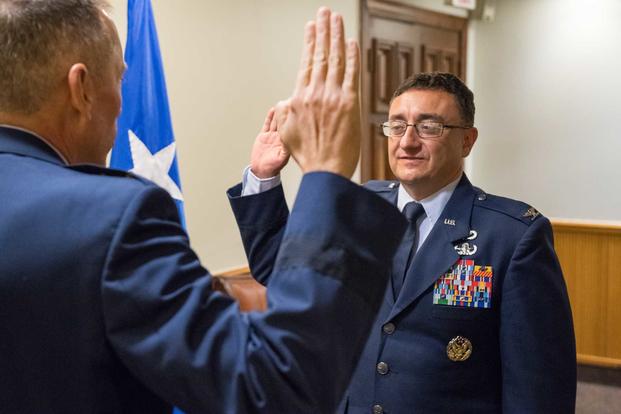The U.S. Air Force has officially split up its Line of the Air Force promotion category, following a months-long effort to query officers about the initiative. The move puts greater emphasis on field-specific expertise during promotion.
The service on Monday announced the change will start in March 2020 for the next lieutenant colonel promotion board, marking the first major restructure to the talent management system since the Air Force was formed in 1947.
This "will be the largest change that we've made in the way officer personnel management is working since the birth of our [Air Force] history," Shon Manasco, assistant secretary of the Air Force for manpower and reserve affairs, told reporters during an Oct. 11 briefing at the Pentagon.
Related: Air Force Surveys Officers on Major Changes to Promotion Process
Newly installed Air Force Secretary Barbara Barrett endorsed the effort in a release following the announcement Monday. "This is an important step forward in the way Air Force leaders are developed," she said. "The team has done exceptional work to get us to this point, and I look forward to implementing this together."
An existing single category, encompassing more than 80 percent of officers within 40 different officer Air Force Specialty Codes (AFSC), will be broken into six new categories, including:
- Air operations and special warfare
- Space operations
- Nuclear and missile operations
- Information warfare
- Combat support
- Force modernization
The career categories allow for closer competition between airmen with similar skill sets, explained Lt. Gen. Brian Kelly, deputy chief of staff for manpower, personnel and services. The new system closely mirrors the Air Force's separate promotion categories for its Judge Advocate General, chaplain and medical corps officers, who compete in their own professions for promotion.
"What really adjusts is who you compete with for promotion," Kelly said Oct. 11. "You … will still be told you're eligible for the board in whichever category you happen to fall in now, and then you will still go through the process with your boss or your senior rater, who will provide you a promotion recommendation that lays out what the recommendation is for you. Rather than competing in a much larger cohort, you're going to compete … with those folks who have similar developments."
The service is sorting AFSCs into the categories that best fit. For example, cyber operations (17X), intelligence (14N), operations research analysis (61A), weather (15W), special investigations (71S), information operations (14F) and public affairs (35X) will be grouped under "information warfare;" pilots would fall under "air operations and special warfare," Kelly said.
Officials in May said they had begun dispatching experts to bases to collect feedback on the plan, given that the LAF promotion system was seen as a limiting, one-size-fits-all approach.
The Air Force wanted to take the next step to adapt to new challenges and skill requirements, in line with the Pentagon's National Defense Strategy, according to officials.
Kelly said the feedback process was key to implementing the new strategy. Along with team meetings with leaders over the last year and a half, personnel and management officials spent roughly six months talking with airmen at more than a dozen bases about the upcoming changes, tweaking the proposal.
Some additional adjustments may be made, depending on how the process evolves, Kelly said.
"This is a pretty dynamic system, and it would be too much hubris on our part to assume that it's perfect now. Things change, just like we know the environment of warfare changes," he said.
Manasco said the service will maintain a degree of flexibility, and hopefully "not wait 72 years before we make another change."
-- Oriana Pawlyk can be reached at oriana.pawlyk@military.com. Follow her on Twitter at @Oriana0214.
Read more: Hikes Are Coming to Air Force Lodging Rates Worldwide; Some in Europe Will Be Doubling












